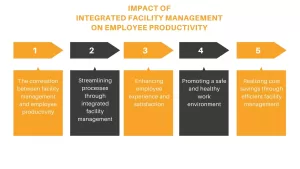1. Introduction
Integrated facility management plays a crucial role in ensuring the smooth operation and efficiency of a workplace. From maintaining the physical infrastructure to providing essential services such as security and housekeeping, facility management companies play a pivotal role in creating a conducive and productive work environment. In India, cities like Mumbai and Bangalore are thriving hubs for businesses, and the demand for top facility management companies in these cities is on the rise. This article explores the powerful impact of integrated facility management on employee productivity and highlights the importance of choosing the right facility management services, including top-rated housekeeping services in Mumbai.
2. The correlation between facility management and employee productivity
Facility management is not just about maintaining the physical infrastructure; it directly impacts employee productivity as well. A well-managed and serviced workplace promotes a positive and comfortable work environment, which in turn helps employees focus better on their tasks. An integrated facility management approach ensures that all aspects of the workplace, including security, cleanliness, maintenance, and comfort, are taken care of.
When employees are not distracted by malfunctioning equipment or a dirty workspace, they can dedicate their full attention to their work. Additionally, prompt response to maintenance issues and efficient management of resources create a hassle-free environment, leading to improved employee morale and job satisfaction.
3. Streamlining processes through integrated facility management
Integrated facility management provides a unique opportunity for businesses to streamline their processes and improve overall efficiency. By centralizing all facility-related tasks and services, companies can effectively manage and allocate resources, ensuring smooth operations and optimal utilization of time and energy.
One significant advantage of integrated facility management is the ability to track and monitor various aspects of the workplace. With advanced technology and data analytics, businesses can gather valuable insights about occupancy rates, energy consumption, and maintenance requirements. These insights enable informed decision-making, allowing companies to identify areas for improvement and implement strategic changes accordingly.
Moreover, integrated facility management helps in standardizing processes and implementing best practices across the organization. By establishing consistent procedures for tasks like maintenance, cleaning, and security, companies can minimize errors and inconsistencies, resulting in increased productivity and higher quality output.
In addition, the efficient management of vendors and service providers is another benefit of integrated facility management. Instead of dealing with multiple contracts and negotiations, businesses can rely on a single point of contact to handle all facility-related services. This not only simplifies the process but also enhances accountability and ensures timely completion of tasks.
By streamlining processes through integrated facility management, companies can create a well-organized and efficient work environment that facilitates employee productivity. With improved workflows, standardized procedures, and effective resource management, businesses can achieve their goals effectively and efficiently.

4. Enhancing employee experience and satisfaction
One of the key factors that contribute to employee productivity is their overall experience and satisfaction in the workplace. Integrated facility management plays a crucial role in enhancing the employee experience by providing a well-maintained, safe, and comfortable environment.
Through integrated facility management, companies can effectively address various aspects that impact employee satisfaction. For example, the automation of maintenance tasks ensures that facilities are in good working condition, reducing disruptions and inconveniences for employees. Additionally, a well-managed and clean work environment can contribute to a positive and professional atmosphere, promoting employee morale and satisfaction.
Moreover, integrated facility management can also cater to the specific needs of employees, such as providing access to amenities and services that enhance their well-being. Whether it’s a fitness center, childcare facilities, or convenient food options, these offerings not only improve employee satisfaction but also promote a healthy work-life balance.
Furthermore, integrated facility management can contribute to employee satisfaction by addressing safety and security concerns. By implementing robust security measures and emergency response protocols, employees can feel secure in their work environment, allowing them to focus on their tasks without worry.
By prioritizing employee experience and satisfaction through integrated facility management, businesses can create a positive work culture that fosters productivity and employee loyalty. Investing in the well-being of employees ultimately leads to increased engagement and performance, benefiting both the individual and the organization as a whole.
5. Promoting a safe and healthy work environment
One of the primary responsibilities of integrated facility management is to ensure a safe and healthy work environment for employees. By implementing comprehensive safety protocols and maintaining high standards of cleanliness, companies can minimize the risk of accidents and promote employee well-being.
Integrated facility management addresses safety concerns by conducting regular inspections and maintenance of facilities. This includes checking fire alarms, emergency exits, and other safety equipment to ensure they are in proper working condition. Additionally, facility managers collaborate with security teams to develop robust security measures, including access control systems and surveillance cameras, to enhance employee safety.
A clean work environment is vital for employee health and productivity. Integrated facility management ensures regular cleaning and sanitation of shared spaces, such as restrooms and kitchens, to prevent the spread of germs and maintain hygienic conditions. This not only reduces the number of sick days taken by employees but also creates a positive and healthy atmosphere that supports their overall well-being.
6. Realizing cost savings through efficient facility management
In addition to creating a safe and healthy work environment, integrated facility management also plays a significant role in cost savings for organizations. By implementing efficient facility management practices, companies can optimize their resources and reduce operating expenses.
One way integrated facility management achieves cost savings is through energy management. Facility managers analyze energy consumption patterns and identify opportunities to reduce energy usage. This may involve installing energy-efficient lighting systems, optimizing HVAC controls, or implementing renewable energy sources. By adopting these measures, organizations can significantly reduce their energy bills and contribute to a more sustainable future.
By focusing on efficient facility management practices, organizations can create a win-win situation. Employees benefit from a safe and healthy work environment, which enhances their productivity and job satisfaction. At the same time, companies can realize substantial cost savings that positively impact their bottom line. The powerful impact of integrated facility management on employee productivity extends beyond just the physical work environment—it also has financial implications that contribute to the overall success of the organization.
7. Conclusion: The essential role of integrated facility management in driving employee productivity
In conclusion, integrated facility management plays a crucial role in driving employee productivity. By creating a safe and healthy work environment, employees are able to focus on their tasks without any distractions or concerns. This leads to increased productivity and ultimately benefits the organization as a whole.
In today’s competitive business landscape, organizations cannot afford to overlook the impact of integrated facility management on employee productivity. It is essential for companies to prioritize and invest in efficient facility management practices to create a win-win situation for both employees and the organization. By doing so, organizations can achieve a powerful and sustainable impact on employee productivity and financial performance.
SILA adopts a tech-driven approach, utilizing Robotics and IoT, Automated Compliance Management, and our proprietary technology (SILA Connect) to efficiently manage properties across India. As pioneers in technology within the facility management sector, SILA stands out as one of the best facility management companies in India.
Industries We serve –
Commercial Offices & Buildings | Manufacturing & Heavy Industrial Facilities | Residential Complexes & Townships | Hotels & Campuses | Airports & Malls | IT Parks & Data Centers | Warehousing & Logistics Parks | Banks & Retail
Present in 125 cities –
Ahmedabad | Baroda | Bengaluru | Chennai | Bhubaneswar | Delhi | Gurugram | Noida | Kolkata | Hyderabad | Kochi | Mumbai | Pune & more
Get a free quote today, to reduce your facility management cost.
Also Read: 5 Steps to Building a Strong Facility Management Culture: A Guide for Success
FAQs
1. What are the key challenges faced in Facility Management?
Challenges may include maintaining ageing infrastructure, ensuring compliance with industry regulations, optimizing energy usage, managing risks associated with hazardous materials, and adapting to technological advancements.
2.What strategies are used to ensure safety in facilities?
Safety protocols, regular safety training for occupants of the space, implementation of proper equipment maintenance schedules, conducting risk assessments, and compliance with safety regulations are some strategies employed to maintain a safe working or living environment.
3. How does outsourcing Facility Management lead to cost savings?
Facility Management proves to be cost-effective. Managing spaces in-house can incur significant expenses. However, outsourcing it not only reduces the time your staff spends overseeing facility operations but also results in long-term savings.
4. What is fire safety management?
Fire safety management involves implementing measures to prevent, prepare for, and respond to fire incidents. It includes risk assessments, fire prevention strategies, and emergency response plans.
5. What are the five components of fire safety?
The five components of fire safety are prevention, detection, containment, evacuation, and response. These elements work together to ensure a comprehensive and effective approach to managing fire risks in a facility.
About SILA -
A Real Estate platform driven by an entrepreneurial spirit.
Our businesses include Real Estate Services which offer Facility Management, Contracting Solutions and Real Estate Advisory. Our other business is Real Estate Development. We have a diverse client base in various sectors which include large Corporates, Real Estate Funds, Landowners and Developers.
Over the last decade, SILA has scaled efficiently, managing over 150 million square feet of assets, with over 20,000 employees pan India. The platform is backed by Norwest Venture Partners and Samara Capital Group in our Real Estate Services and Development arms, respectively.
SILA is one of the best facility management service provider in Mumbai, Bengaluru, Delhi, Chennai, Hyderabad, Pune & more.
SILA is among the top facility management companies in India, offering comprehensive property management services and housekeeping solutions. As a leading facilities management company, SILA provides tailored FM solutions, including housekeeping services in Mumbai. Leveraging our expertise, we ensure seamless property management for clients nationwide. Whether you require housekeeping agency support or specialized facility management solutions, SILA delivers excellence in every aspect of your property’s upkeep and maintenance.
About Author -

Aniket Sheth
The insightful content in this blog is curated by Aniket Sheth, our esteemed Senior Vice President of Operations. With an impressive professional journey spanning over 13 years, Aniket has held key positions at prestigious brands, showcasing his exceptional leadership skills.
Aniket’s educational background is marked by an MBA from Cornell University, which laid the foundation for his successful career. He began his professional journey at EY in New York, contributing significantly to enhancing and implementing engagements for Fortune 500 companies.
Aniket’s strategic acumen, proficiency in asset management, and forward-thinking innovation have been instrumental in helping companies streamline their operations and achieve substantial cost reductions. His wealth of experience brings a unique perspective to the world of facilities management, making his insights invaluable for businesses seeking operational excellence.


